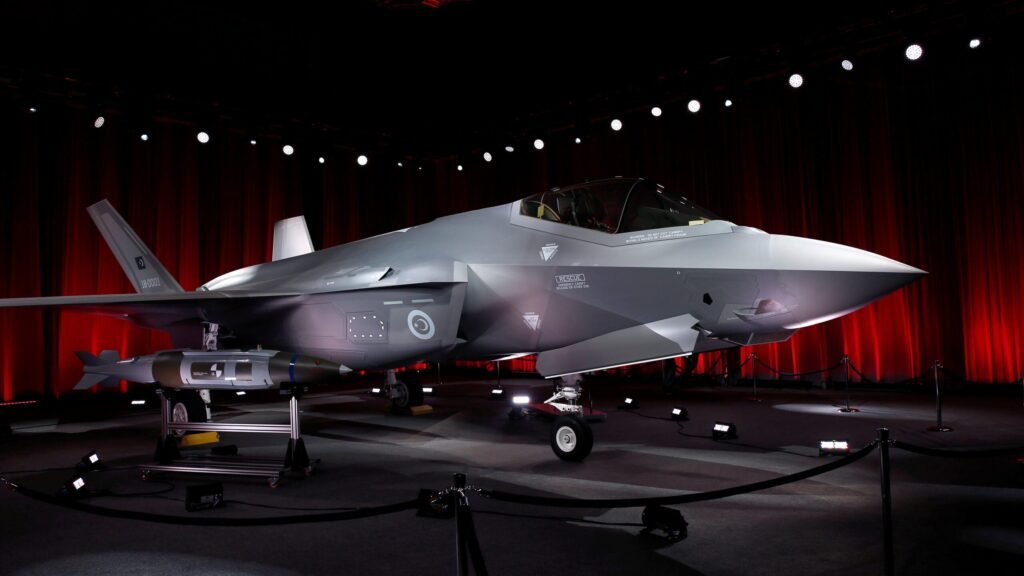A F-35 fighter jet is seen as Turkey takes delivery of its first F-35 fighter jet with a ceremony at the Lockheed Martin in Forth Worth, Texas, United States on June 21, 2018. (Atilgan Ozdil/Anadolu Agency/Getty Images)
WASHINGTON: As NATO members work to figure out what Turkey will accept in exchange for allowing Sweden and Finland to join the alliance, an emerging question is whether Turkey would be allowed back into the F-35 program as part of the negotiations.
The answer, as far as the chairman of the House Armed Services Committee is concerned, is pretty clear: “Turkey’s not coming back into the F-35 program,” Rep. Adam Smith, D-Wash., told reporters this morning at an event hosted by the Defense Writers’ Group.
Turkey was an early partner in the F-35 program, and helped fund the development of the jet. The plan was for them to purchase 100 of the F-35A models, which have been bought by a number of NATO countries. However, a decision by Ankara to purchase the Russian S-400 air defense system set off alarm bells, with the US and others raising concerns that the Russian system would be used to gather information about the F-35 for Moscow.
After several years of negotiating, Turkey in July 2019 accepted the S-400 onto its soil, and the Trump administration responded by kicking Turkey from the F-35 program, costing Ankara both its fleet of stealth fighters and the industrial base benefits of being in the program.
Fast forward to May, when Sweden and Finland, after years of balancing between Russia and NATO, announce they will seek alliance membership. While a number of nations, including the US, appear prepared to fast-track their ascension, bringing them into the fold requires the support of every NATO nation – and Turkey, in a surprise move, announced it was blocking the process, largely over Sweden’s decision to withdraw arms export licenses for Ankara and what the Erdogen government calls Stockholm’s support for terrorist organizations.
The assumption at first was that the situation would be worked out quickly, with NATO Secretary General Jens Stoltenberg indicating he expected a rapid ascension for the two Nordic nations. A month later, comments from Stoltenberg and others seem to indicate an acceptance that Turkey doesn’t plan on backing down anytime soon, leaving the upcoming NATO meeting in Madrid — which weeks ago looked like it would be a celebration of the two new entrants and NATO’s increased unity following the Ukraine invasion — to be a potentially awkward affair.
As a result, there has been speculation that the biggest bargaining chip the Biden administration has to play is to offer up weapons to Turkey, especially re-entry into the F-35 program. Smith, however, sees no path forward on the stealth fighter for Ankara as long as the S-400 is a ongoing concern.
“It’s not about, you know, punishing Turkey for buying Russian weapons systems. It’s about not having the S-400 in the same place as the F-35 and the potential loss of critical information there to the Russians on that,” he said, before indicating that there are other levers that could potentially be pulled.
“I think the way it ends is basically get some sort of weapons to them. It probably won’t be the F-35… And I don’t know what Europe does or does not sell Turkey,” Smith said. “I think I see that’s probably the way this ends.”
And even then, “it is not inconceivable that Erdogen looks at the whole thing and says, ‘Yeah, I’m not going, you haven’t offered me enough. This is the one lever I’ve got. We’re not voting Sweden and Finland.’ It is not inconceivable that he thinks that’s his best play. And it is our job, and Sweden and Finland’s job, to negotiate so that that’s not what comes out, and that’s what we’re going to have to try and negotiate.”
Smith does not have direct control over a final decision to allow weapon exports to Turkey, as that falls more into the purview of the Foreign Relations committees. But as the HASC chair from President Joe Biden’s party, he undoubtedly has insight into the issue. (Notably, Secretary of State Antony Blinken last week said fighter jet decisions on Turkey are “separate” from the Sweden/Finland issue.)
More broadly, Smith pointed to the Turkey situation as a reminder that the US has to have have “flexibility” when dealing with countries abroad who may not be willing to make hard choices about ties to the US over relations with China and Russia.
“The rest of the world still has trust issues with us. And there’s a lot of members of Congress who are steeped in the idea that America is perfect. They don’t seem to grasp that, you know, Turkey, India, a whole bunch of countries in the world, they’re hedging their bets. And we say, ‘You have to be with us or Russia and China,’ and they’re still kind of, like, playing off all of that. And they’re not all in on the idea — even with what’s happening in Ukraine, as horrific as it is — they’re not buying into the notion that they can push away Russia and China, and even to some degree Iran, and go all in the US.
“We’re going to have to, sort of, work with them, show a greater level of flexibility, acknowledgement of our own limitations and past mistakes in order to build that coalition,” Smith continued. “The world’s not a perfect place. Your allies and friends are not going to be exactly where you want them to be. And we need to acknowledge that we are not exactly the way our friends and allies we would like us to be, either. So how can we get along and [have a] partnership here, given the threat that I believe Russia and China pose to the global order?”
Source: Breaking Defense



